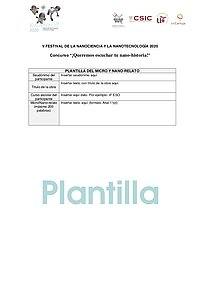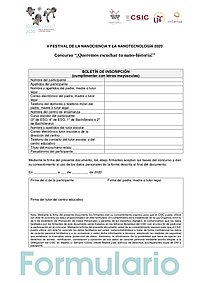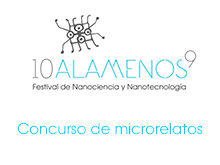As part of the 10alamenos9 festival initiatives, a short story contest has been organised at both national and regional levels.
The Festival aims, in an entertaining and exciting way, to bring the nanometric scale, its effects and how this knowledge is going to change our lives through countless applications and products closer to all audiences. Age and previous knowledge do not matter!
We want to hear your nano-story!
This contest is held at two levels: one at the level of some Autonomous Communities and another at the national level. The rules of the contest, in each case, will have two sections, one dedicated to the phase in each Autonomous Community and another dedicated to the national phase. Participants from educational centres located in a given Autonomous Community must follow the instructions corresponding to the Phase in said Community.
PHASE IN THE AUTONOMOUS COMMUNITY OF ANDALUCIA
This competition, at the level of the Community of Andalusia, is organized by the Institute of Materials Science of Seville (ICMS), a joint center belonging to the Higher Council for Scientific Research (CSIC) and the University of Seville (US), within the framework of the V Festival of Nanoscience and Nanotechnology. The objective of the micro- and nano-stories is to promote the general interest of the educational community in nanoscience, nanomaterials and nanotechnology, which, despite its tiny size, offers us endless possibilities.
RULES
The MICRO and NANO-STORIES competition is aimed at students in the 3rd and 4th year of Compulsory Secondary Education (ESO) and 1st and 2nd year of Baccalaureate, who are studying in public, subsidized or private centers located in Andalusia.
Each contestant may submit, under a pseudonym, a single work with which they have not participated in any other contest. MICRO and NANO-STORIES will be written in Spanish and will have a maximum length of 200 words. They can deal with any topic such as science fiction, mystery, adventure, fantasy, social stories, etc. Other types of written works such as poems or song lyrics may also be submitted. The only requirement is that the submitted work is related to nanoscience, nanomaterials and nanotechnology.
The deadline for submission is April 15, 2020.
The stories must be sent in a Word or PDF file. Residents of the Community of Andalusia who wish to participate must download both the template for writing the story and the registration form. Participants must use a pseudonym. The literary work will be sent using the corresponding template and will be called “Pseudonym” (for example “Nanomotor.pdf” or NanoCristina.pdf). The registration form contains the participant’s identification data and their pseudonym. Once this document has been completed, it will be signed by the participant, the tutor of the educational center and by the parents or legal guardians, who thus consent to the participation of the minor in the contest and certify the acceptance of the rules. The registration form, duly signed and scanned in PDF format, must be called “Pseudonym_Registration” (for example “Nanomotor-Inscripción.pdf or NanoCristina-Inscripción.pdf).
The participant will simultaneously send the two documents (work and registration) to the address with the subject “Nano-story 2020”.
Failure to comply with these rules will disqualify the submitted work.


All works will remain in the possession of the Higher Council for Scientific Research for later use, either in print or digital format on the CSIC websites. In any case, the use of the works will never be for profit and the authors of the selected stories will always be cited, as well as their educational centers.
JURY
The Jury will be made up of researchers belonging to CSIC and US centers located in Andalusia.
The jury’s decision will be made public on April 24, 2020 and will be communicated to the interested parties and their schools.
The awards may be void if the submitted works do not meet a minimum quality.
The Jury’s decision will be final.
PRIZES
Prizes for participating students.
Prizes will be awarded in two categories:
- Category A: 3rd and 4th year of ESO;
- Category B: 1st and 2nd year of Baccalaureate.
Two prizes will be awarded (courtesy of the ICMS and the CIC Cartuja), one for each category, with a prize of €200 each.
The prizes will be presented during the Nanodivulgadores day that will be held at the CiC Cartuja in Seville on May 4, 2020.
The prizes, given their monetary nature, will be transferred to a bank account in which the winning participant is co-holder with his or her father, mother or legal guardian. The corresponding tax deduction (IRPF) will be applied to the prizes. Once the minutes with the jury’s decision are published, instructions will be given to the winners for collecting the prize.
A certificate of accreditation will be awarded along with the prizes.
Prizes for Educational Centres
The Educational Centres in which the two winning participants study will receive a set of popular science books from the collection “What do we know about…” co-published by the CSIC and the publishing house La Catarata.
The prizes for schools cannot be combined.
NATIONAL PHASE
The two works awarded in each competition at the regional level, one per category, will automatically move on to the national phase, for evaluation by a Jury made up of researchers in the field of nanoscience and nanotechnology, scientific communicators and people from the literary field.
In the event that a work is written in Catalan, Galician or Basque, the author will need to translate the work into Spanish, after prior communication from the organisation at the regional level, so that the Jury can make its comparative assessment with the rest of the works.
The decision of the jury of the national phase will be made public before 31 May 2020 and will be communicated to the interested parties and their schools.
The jury’s decision will be final.
In the national phase, a prize of €200 will be awarded for each of the two categories:
- Category A: 3rd and 4th year of ESO;
- Category B: 1st and 2nd year of Bachillerato.
This prize will be added, where applicable, to the corresponding prize of the regional phase.
Given their monetary nature, the prizes will be transferred to a bank account in which the winning participant is co-holder with his or her father, mother or legal guardian. The corresponding tax deduction (IRPF) will be applied to the prizes. Once the minutes with the jury’s decision are published, the Institutional Delegation of the CSIC in the Community of Madrid will give instructions to the winners for collecting the prize.
A certificate of accreditation will be awarded along with the prizes of the national phase.



